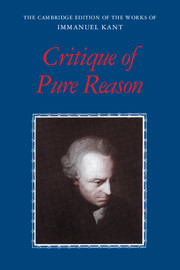Book contents
- Frontmatter
- Contents
- General editors' preface
- Acknowledgments
- Introduction
- Immanuel Kant, Critique of Pure Reason
- Table of Contents
- Motto (added in the second edition)
- Dedication
- Preface (to the first edition)
- Preface to the second edition
- Table of Contents (as in the first edition)
- Introduction (as in the first edition)
- Introduction (as in the second edition)
- I Transcendental doctrine of elements
- Division two. Transcendental dialectic
- II Transcendental doctrine of method
- Editorial Notes
- Glossary
- Index
Preface to the second edition
from Immanuel Kant, Critique of Pure Reason
- Frontmatter
- Contents
- General editors' preface
- Acknowledgments
- Introduction
- Immanuel Kant, Critique of Pure Reason
- Table of Contents
- Motto (added in the second edition)
- Dedication
- Preface (to the first edition)
- Preface to the second edition
- Table of Contents (as in the first edition)
- Introduction (as in the first edition)
- Introduction (as in the second edition)
- I Transcendental doctrine of elements
- Division two. Transcendental dialectic
- II Transcendental doctrine of method
- Editorial Notes
- Glossary
- Index
Summary
Whether or not the treatment of the cognitions belonging to the concern of reason travels the secure course of a science is something which can soon be judged by its success. If after many preliminaries and preparations are made, a science gets stuck as soon as it approaches its end, or if in order to reach this end it must often go back and set out on a new path; or likewise if it proves impossible for the different co-workers to achieve unanimity as to the way in which they should pursue their common aim; then we may be sure that such a study is merely groping about, that it is still far from having entered upon the secure course of a science; and it is already a service to reason if we can possibly find that path for it, even if we have to give up as futile much of what was included in the end previously formed without deliberation.
That from the earliest times logic has traveled this secure course can be seen from the fact that since the time of Aristotle it has not had to go a single step backwards, unless we count the abolition of a few dispensable subtleties or the more distinct determination of its presentation, which improvements belong more to the elegance than to the security of that science.
- Type
- Chapter
- Information
- Critique of Pure Reason , pp. 106 - 124Publisher: Cambridge University PressPrint publication year: 1998
- 2
- Cited by

